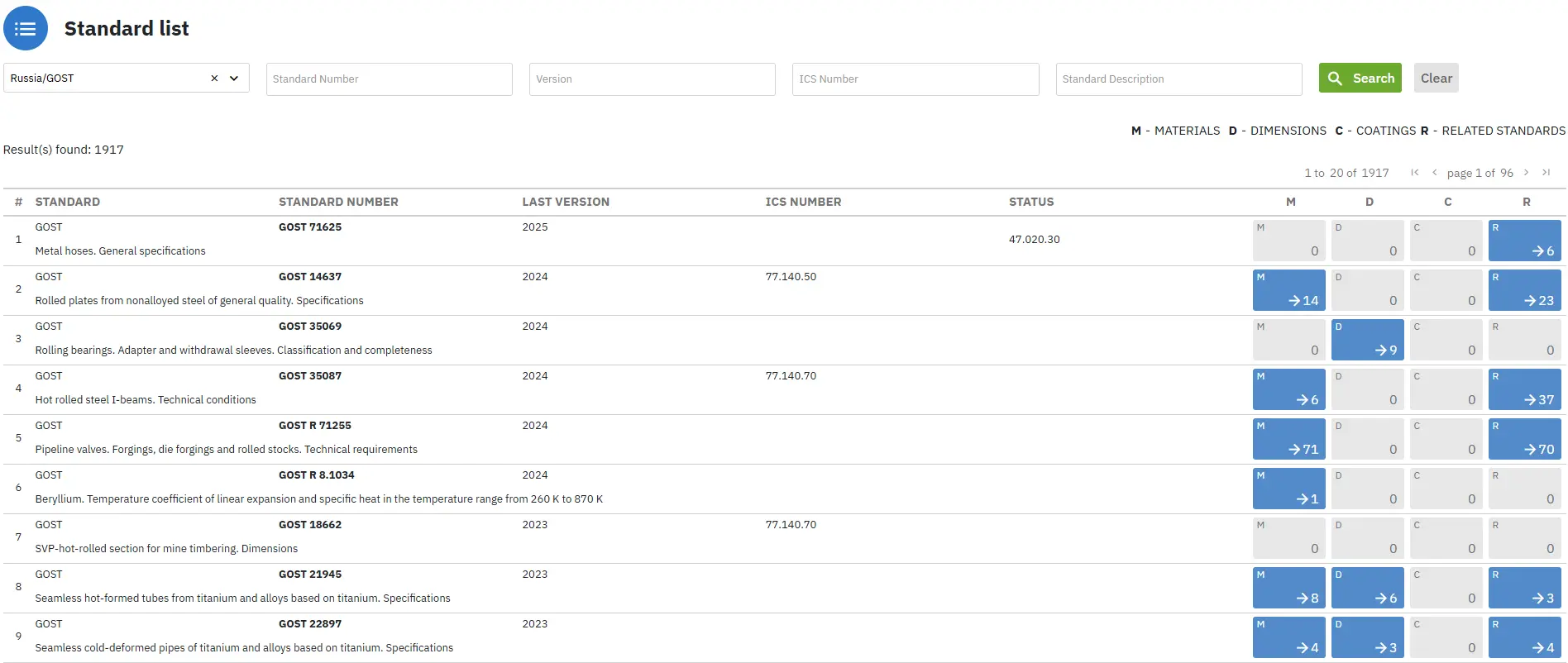Introduction to the GOST Designation System
Abstract
The word GOST (Russian: ГОСТ) is an acronym for gosudarstvennyy standart (Russian:государственный стандарт), which means state standard. The GOST standards carry a two-part number, the first of which is a serial number, and the second, to indicate the year of issue, i.e., GOST 1577-70.
GOST standards were originally developed by the government of the Soviet Union as part of its national standardization strategy. The word GOST (Russian: ГОСТ) is an acronym for gosudarstvennyy standart (Russian:государственный стандарт), which means state standard.
The following countries have adopted GOST standards in addition to their own, nationally developed standards: Russia, Belarus, Ukraine, Moldova, Kazakhstan, Azerbaijan, Armenia, Kyrgyzstan, Uzbekistan, Tajikistan, Georgia, and Turkmenistan.
The acronym GOST is still used for the purpose of identification of technical standards that are actively used in Russia and the CIS /Commonwealth of Independent States/. Thus, to distinguish, the official standards of the CIS are called GOSTs. While GOST R is the acronym used by both the national standards of Russia and the Russia's national certification program for products.
The GOST standards for metals and alloys are somewhat similar to the US ASTM, SAE, or AISI general class specifications. The designations and criteria for individual alloys are grouped under each standard. The GOST standards carry a two-part number, the first of which is a serial number, and the second, to indicate the year of issue, i.e., GOST 1577-70. The serial number is not often changed when a standard is revised, but the indicated year of issue is changed to reflect the date of the latest revision. The standard numbers are often indicative of broad fields of intended use (i.e., springs, constructional steels, etc.). Therefore, essentially the same alloy may appear in any number of standards depending on the number of applications it has.
While the GOST composition-designation system is relatively simple and is consistent within each alloy class, there is some overlap between the various alloy classes in regard to what some of the letters stand for. Thus, while M stands for molybdenum in a GOST steel designation, it stands for copper in the GOST aluminum alloy and copper alloy designations.
Also, while most GOST designations in the literature are in upper-case letters, extreme care should be exercised to avoid confusion in designations which have both upper and lower case letters in them, i.e., Mts (M4) in GOST aluminum and copper alloy designations signifies manganese, while M (M) alone signifies copper and Ts (W) alone (note that (W) is upper case here) signifies zinc.
Also Cyrillic letters Z (3) and a (0) have often been confused with the numerals 3 (three) and 0 (zero). Soviet linotype operators often use the letter (3) in place of the numeral 3. Examples of overlap in GOST designations previously discussed are shown in the Table 1:
Table 1: Examples of Dual Meanings of Cyrillic Letters in GOST Alloy Designations
| Cyrillic Letter | Corresp. Latin Letter | Steels | Tool Steels | Aluminum Alloys | Nickel Alloys | Copper Alloys | Metals |
| A | A | Nitrogen | Aluminum | Aluminum | Aluminum | ||
| A* | A | High-quality steel | |||||
| Ю | Yu | ||||||
| Б | B | Niobium (Columbium) | Beryllium | Beryllium | |||
| В | V | Tungsten | Wrought alloy with non-alloying addition | ||||
| Д | D | Copper | Duralumin | ||||
| M | M | Molybdenum | Copper | Copper | Copper | ||
| Г | G | Manganese | |||||
| K | K | Cobalt | Silicon | Silicon | Calcium | ||
| C | S | Silicon | Lead | Calcium | |||
| Ф | F | Vanadium | |||||
| P | R | Boron | High-speed Steel | ||||
| Бp | Br | Bronze | |||||
| Ц | Ts | Zirconium | Zinc | Zinc | |||
| П | P | Phosphorus | |||||
| З | Z | Sulfur | |||||
| Зл | Zl | Gold | |||||
| Пд | Pd | Palladium | |||||
| Пт | Pt | Platinum | |||||
| O** | O |
* When an appendage
** Cyrillic letters that may be confused with numerals
Click on the link to see a list of GOST Standard List covering the following material categories:
- Irons
- Structural and Constructional Steels
- Stainless Steels
- Castings
- Forgings
- Coated Steels
- Welding and Filler materials
- Powder Metallurgy/Sintered Materials
Trova e confronta immediatamente le proprietà dei materiali russi GOST!
Total Materia Horizon contiene informazioni dettagliate e precise sulle proprietà di migliaia di materiali secondo gli standard russi GOST, aggiornate mensilmente.

Ottieni un account di prova GRATUITO su Total Materia Horizon e unisciti a una comunità di oltre 500.000 utenti provenienti da più di 120 paesi.